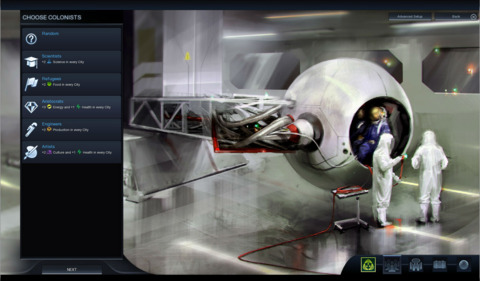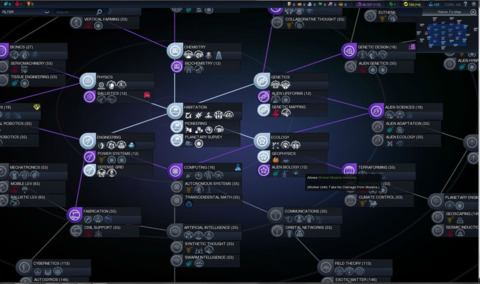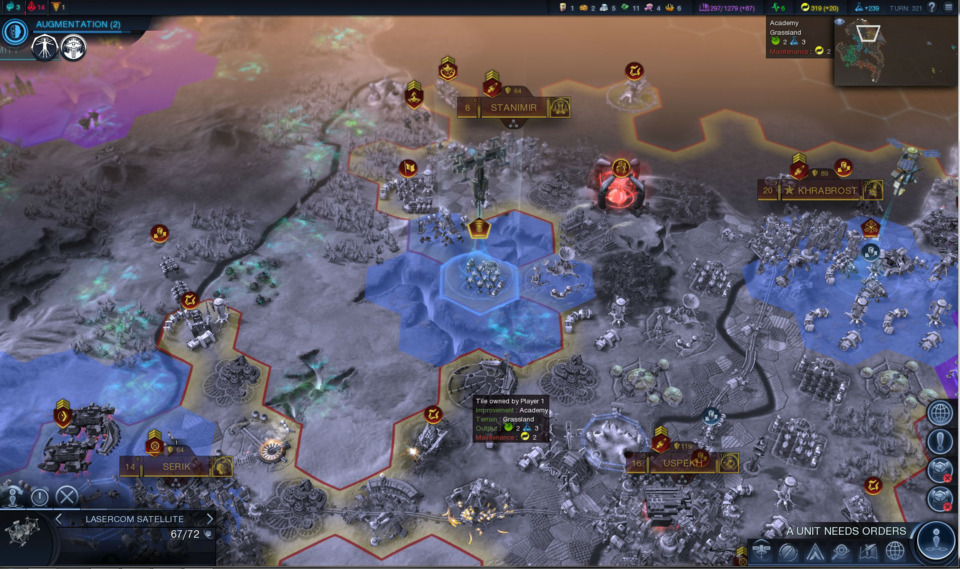After three years of expansions and patches to Civilization V, Firaxis has moved its venerable strategy series off-world in Civilization: Beyond Earth. Instead of guiding the many noteworthy cultures of Earth's past, you're sending the last remnants of humanity into the vast, uncharted nether of space to colonize an alien world. Alongside rival Civs, you'll expand your initially meager settlement into a bustling society with radical new technologies, all the while forming a relationship with the world you've settled that can range from harmonious to actively antagonistic. And you'll do all of this using roughly the same design structure as Civilization V. Sure, victory conditions have changed, the roles of culture, diplomacy, and espionage have shifted, and Civ V sure as hell didn't have giant worms roaming across any of its un-modded landscapes. But if you're the sort that spent countless, sleep-deprived hours building society after society in Civ V, you'll likely encounter the same creeping feeling of over-familiarity that I did.

Given that familiar feeling, it's tempting to call Beyond Earth a gussied-up expansion pack for Civ V. The nuts and bolts of Beyond Earth's basic UI, pacing, and visual design all feel in lockstep with what Civ V offered. Jumping into my first game, I had no trouble at all figuring out how to start progressing my new colony. Like always, I sent out a scout (explorer) to start looking for ruins (in this case, a mixture of "resource pods," alien remains, and ancient alien ruins) and barbarian encampments (alien nests), began work on my first cultural monument (earth relic), and began researching my first technologies. But then, little wrinkles started to show up. I discovered that numerous areas of the map were coated in a noxious alien miasma, and that taking units through it would damage them. I also realized that alien creatures were numerous in ways that the barbarians of old never, ever were. Yet they were also generally non-threatening, unless I happened to wander too close to their teeming nests.
The early game becomes a matter of figuring out the best ways to navigate around the more hostile aspects of the environment until you've researched enough technologies to start overcoming them, and this is by far the most exciting part of the game. There's a genuine sense of wonder that comes from exploring these harsh, alien environments, and a decent amount of variety to how you approach them. That variety comes in the form of the game's new affinity system. These affinities allow you to dominate your environment in one of three distinct ways. The supremacy affinity is all about transhumanism, turning your society into a fearsome, militaristic technocracy. The harmony affinity swings entirely in the other direction, blending humanity with the planet's native biology, and turning the planet's most toxic elements into a protective boon. Purity is all about retaining your humanity and turning your colony into something decidedly Earth-like.
Each of these affinities comes with its own set of units, specialty techs, and victory conditions. Every time you complete a task or technology that boosts an affinity, your Civ gets a little boost. Sometimes it's just an upgrade for a particular unit type--these upgrades adjust the look of your units, in addition to their stats--and sometimes it's something felt society wide. Each affinity must be pushed to level 13 in order to unlock its victory condition, though you'll have to do more than just boost that affinity level to get there.
You'll also have to finish quests, which are a new, if not overly exciting addition to the Civ formula. The quests that pertain to victories are static, and usually involve some combination of tech research and unit building to unlock a victory-specific project. There are also a pair of victory options that exist outside of affinities; one involves digging through ruins and unlocking an ancient signal from an unseen alien race, while the other is the good old domination victory.

Those last two mark the only good options for victory if you find yourself lagging behind in the affinity specific ones. In Beyond Earth, planning your method of victory is essential from the get-go. This is the result of the game's reliance on its new tech web, a branching system of technologies to research that's initially daunting to get the hang of. There are a lot of different technologies to play around with, many of which you will have to actively ignore if you want to build up your affinity at a good pace. Victory quests do at least specify what technologies you'll need to research to win, but that won't prevent you from potentially falling behind other Civs, and once you have, it's extremely difficult to pivot to an alternate victory condition.
This makes the late-game progression of Beyond Earth a bit of a drag. With most of the victory conditions being so similarly rigid in design, there's rarely any opportunity to throw off any other Civ's progress outside of military intervention. Once you get to the point of having your victory device built, you end up just waiting around--sometimes you have to press a specific button or guide a specific unit each turn as well--until the game is over. And even on some of the higher difficulty settings, the A.I. rarely seems aware enough of your impending victory to do anything about it. At best, they may denounce you, but it's extremely rare to see a computer player actually wage war in an attempt to stop you. Passiveness in A.I. is something that Civ V often had an issue with, and nearly every game I played in Beyond Earth demonstrated similar problems.
Combat in general is not a particularly thrilling thing in Beyond Earth. At the outset, when all you have are a few weak units to deal with potentially huge volumes of aliens, there's a degree of tension when trying to figure out if you should engage or just hang back and defend. But once you get a few upgrades, they become little more than a brief nuisance. Strangely, the same feeling applies to combat against other Civs. Even though they advance units at roughly the same pace you do, they're rarely difficult to slice through in battles. Some of that is due, again, to the A.I., which can't often seem to figure out how to flank properly, or even properly navigate the terrain.
The relative ease of those battles negates some of the fun you might have tinkering around with your unit upgrades. It's great that you get distinct choices for how you want your units to improve, but those bonuses are meaningless if you can just bowl over enemies regardless of what you choose. That kind of meaninglessness of choice became more apparent with each game of Beyond Earth I played. While it was initially fun to play around with different techs and buildings and wonders, after a while I realized that most of them didn't really have any significant impact on my ability to win the game. In Civ V, getting the right wonders and buildings built could greatly impact the speed of your Civ's progress. Here, it starts to just feel like busywork after a while, especially once you've gotten the necessary techs and units built to get the endgame race going.

It's not just buildings and wonders that suffer from this problem. There are tons of new tile improvements to build, plus new orbital units that provide culture, energy (the game's currency), and defensive boosts, among others, to swaths of your territory. Yet few of these things ever feel especially vital. I went through entire games just building one or two orbital units (often in cases where satellites were required for a victory condition), and got by just fine. The variety of tile improvements for workers to build ensures a diverse looking terrain by the time your game is done, but many of these improvements are just slight stat tweaks compared to other improvements you've been building since the beginning of the game. There is a ton of variety in how to design your society in Beyond Earth, yet little of it feels consequential to your path to victory.
Other systems introduced in Civ V and its expansions have either been left as-is or removed altogether. Religion is gone, though you could argue that the affinity system is a more than capable replacement. Culture has been scaled back considerably, relegated to unlocking perks in the game's version of the policies menu. There are no great people to spawn, nor city states to interact with--the game's closest equivalent, independent stations that can be used for trade, offer little else in terms of interaction. Espionage, at least, has seen a more significant overhaul. Spies planted in other capital cities can still steal technologies, but not right away. You have to level them up by performing other, simpler tasks, like establishing a spy network, or syphoning energy. Performing operations successfully raises the intrigue level in the city, and opens up more elaborate possibilities. If you've exhausted the number of useful technologies a rival Civ has, maybe it's time to recruit some defectors in the form of stolen military units, or even stage a coup to overthrow the city itself.
Except that rarely ever works. Performing a long string of successful operations is very difficult, because there's always a chance the agent may be detected. Detection does not equal death automatically, but even when not killed, agents are less effective once spotted, and usually need to be sent elsewhere to start all over. And even if you do manage to perform enough successful operations to get to those higher level ops, I never had a single one past the defectors mission succeed.

Between these various issues, and Beyond Earth's unfortunate lack of personality, I had a hard time mustering up the desire to keep playing it beyond my first few play-throughs. That, to me, is the most damning thing about it. Say what you will about Civ V and its lingering problems, there was an intangible quality to that game that kept its hooks in you for long stretches of time. Maybe it's the lack of historical flavoring, maybe it's the lack of meaningful Civ personalities, or maybe it's the lack of consequence to the choices the game constantly presents you with. Whatever it is, there's definitely something missing from Beyond Earth's transcendental equation.
It's a shame, because Beyond Earth offers up a tantalizing premise that, nonetheless, feels incomplete. Its best parts are aesthetic in nature, changes to a visual palette that evoke a world of futuristic possibility. Yet the game itself feels regressive compared to the many changes made to Civ V's formula throughout its lifespan. People who thought better of spending countless nights clicking through turn after turn in Civ V might get a bit more out of Beyond Earth's alterations to that formula. But for those who, like me, dumped hundreds of hours of their fleeting lifespan into Civ V and its expansions, Beyond Earth is more a glimpse of potential greatness--the sort that would come from future updates--and less a great game in its own right.